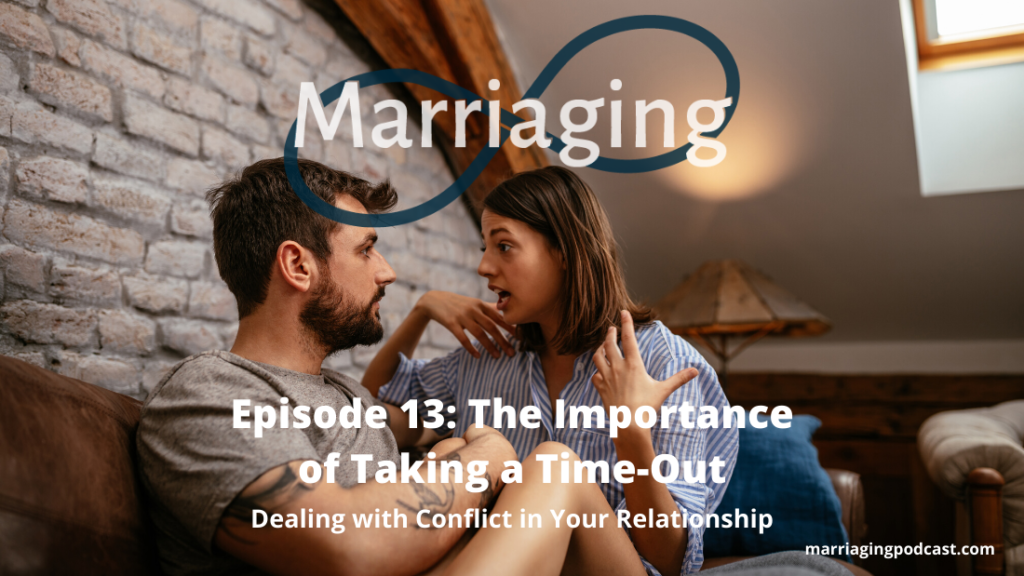
Marriaging Podcast Episode 13: The Importance of Taking a Time Out: Dealing with Conflict in Your Relationship
The Importance of Taking a Time-Out: Dealing with Conflict in Your Relationship
Conflict with your partner can get heated at times, and you end up saying hurtful things. When harsh words or angry tones come up, it only leads to more distance between the two of you. Taking a time-out in conflicts like these can be helpful, but it’s important to know how to take the time-out, and how to come back together.
How to take an effective time-out:
- Prior to any conflict, talk with your partner about time-outs and why you think this could help with conflict in your relationship. Let your partner know that there might be times you call a time-out. They have a right to do so as well. Agree on a specific amount of time for a time-out. This might be 20-40 minutes.
- When you or your spouse notice conflict is escalating, one or both of you then has a right to call “time-out”. You both agree on how long you need, or have already agreed on this and can put it into action.
- You each go to your own space. This might be another room, or walking outside.
- You don’t use this time to mope or complain or allow yourself to get angrier. Instead, you ask yourself these questions:
- What specifically upset me in this situation?
- What does this issue actually mean to me? Do I feel unheard or unimportant to my partner, or something else?
- How was I reacting?
- How did my reaction make my partner feel? How might it have impacted them?
- Did my reaction make our conflict worsen?
- Use your time-out to reflect on how you could also handle the situation differently and communicate your needs without being harsh toward your partner.
How to come back together after a time-out:
- Agree to sit down together when the time-out is done. Find a comfortable space to sit close and face each other. If you recognize that you’re still very reactive and not in a clear space to have open communication with your spouse, gently ask for more time. Agree to come back together after a set amount of time.
- Take turns each sharing how you actually felt, and recognize how your reaction made your partner feel. This isn’t about blaming. This is about taking responsibility and building empathy for each other.
- Spend time talking through what you each actually needed prior to getting into a conflict about it. This is when you can problem-solve together.
- Assume the best of each other and be willing to hear your partner out.
What else you need to know about time-outs:
- Sometimes it can be hard to come back together after a short amount of time. Or if you’re fighting late at night when you’re both tired and need to sleep, it’s hard to resolve conflict. With situations like these, it makes sense that you aren’t going to reconvene after a short time-out. It’s okay to postpone it to the next day, but if you do this, you both need to schedule a time and commit to talking at that time. If you keep postponing it, it won’t actually be worked through.
- Time-outs won’t work well if you come back to your partner and you’re in a defensive mode. Time-outs are meant to help you calm down and really process a situation. When you come back together, it’s important for your relationship that you work to be vulnerable and open with your spouse.
Special thanks to:
Will Gladden of LEVEL Digital Music Entertainment for making the music for the podcast.
Connect:
My mission with the Marriaging podcast is to help you create a more authentic and connected relationship. I’m always working to provide you with the best help for improving communication and intimacy in your marriage. Please subscribe and leave a rating and a review to support the podcast.
Connect with me at marriagingpodcast.com
Instagram: @marriagingpodcast
Twitter: @marriagingpod
